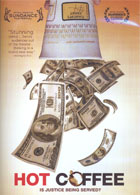
Hot Coffee 2011
Distributed by Docurama Films, New Video Group, 902 Broadway FL 9, New York, NY 10010; (212) 206-8600
Produced by Carly Hugo, Sheila Nevins, Alan Oxman
Directed by Susan Saladoff
DVD, color, 86 min.
Sr. High - General Adult
Ethics, Journalism, Law, Media Studies, Social Sciences, Sociology
Date Entered: 03/14/2012
ALA Notable: ala.gif
Reviewed by Jennifer Dean, MALS student, City Univerity of New York (CUNY Graduate Center)
The documentary Hot Coffee advocates for the civil justice system in the United States against misconceptions of the aims of tort reform. Directed by a former attorney of Trial Lawyers for Public Justice, Hot Coffee makes its case through four stories: the now infamous case of Stella Liebeck who won a civil suit for several million dollars against McDonald’s for burns inflicted by a hot cup of coffee; a malpractice case of a couple who sued after giving birth to a mentally disabled child; a young woman forced into arbitration after being raped and beaten in Iraq while working for a Halliburton subsidiary; and Justice Oliver Diaz in Mississippi who was the victim of corporate political machinations.
First time filmmaker Susan Saladoff creates an entertaining and visually appealing documentary that moves quickly and clearly makes its case but fails to delve very deeply into the complex issues it raises. In the extras on the DVD Saladoff comments that she was unfamiliar with filmmaking but knew about storytelling thanks to her experience as a trial attorney and equates her archival footage with exhibits and characters in the film with clients. The documentary does very much unfold as one might expect a court case to be presented; however, at trial the audience receives the story from both the plaintiff and the defense. This documentary only presents one side of the case. Even though Hot Coffee understandably has a clear point of view it would definitely have been improved by at least giving some voice to those advocates of Tort Reform. Saladoff uses the documentary forum to argue against her preconceived notions of what the audience has already been exposed to (by showing clips from sitcoms, newscasts and political speeches) but doesn’t give voice to the point of view she argues against. Blurbs that tell us she is unable to get an interview with a representative from the U.S. Chamber of Commerce or Karl Rove, and man on the street interviews providing only sound bites don’t make up for the lack of counterpoint. The documentary also assumes that civil litigation works in regulating corporations and ensuring public safety. Joan Claybrook, former President of Public Citizenry claims that if an individual presents their case effectively they “have just as much a chance of winning as General Motors does” and that the judicial branch is the only place where that is possible - ignoring that General Motors has many more resources to fight a case in the judicial system, which does undoubtedly affect the outcome. Despite the film’s assertions, however, there is also evidence present in the movie against the efficacy of relying on the civil suit system to regulate corporations. The film points out that the award given to Ms. Liebeck only amounted to two days of coffee sales for McDonald’s, hardly enough to warrant other corporations spending massive amounts of money to prevent future harm. The film culminates with an emotional plea for the accountability enforced by the civil system but never raises the idea that accountability can occur via other means (criminal and legislative not just civil action).
The film is recommended with reservations because I do think that Hot Coffee raises interesting questions and issues of how the judicial system works (or sometimes doesn’t) – and paired with another documentary (such as perhaps The Corporation (2003) which takes a broader look at how corporations function in the United States) would stimulate discussion. One of the action steps promoted by Saladoff in the Extras on the DVD is to “be a savvy consumer of media – question whether or not you are getting the full story.” And of course, that should also be applied to her documentary.
Awards:
- Grand Jury Prize, Best Documentary, Seattle International Film Festival
- Grand Jury Award for Best Documentary Feature, Gaspilla International Film Festival
- The Documentary Everyone in America Should See Award, Traverse City Film Festival